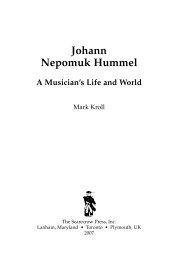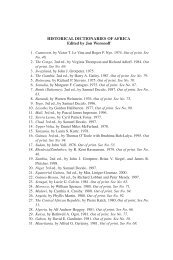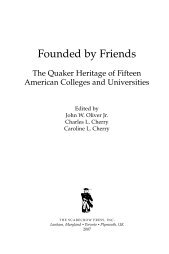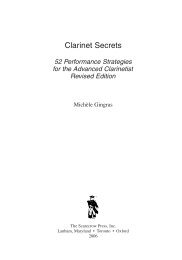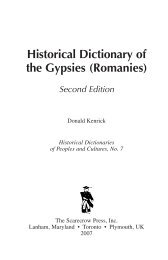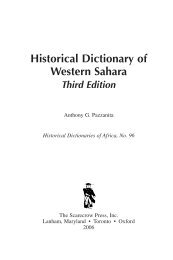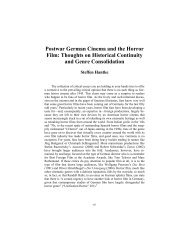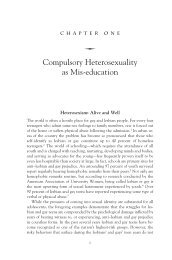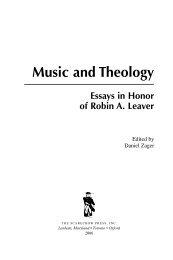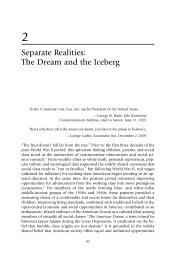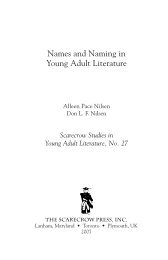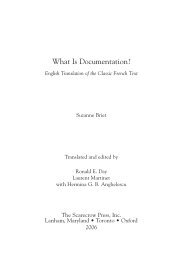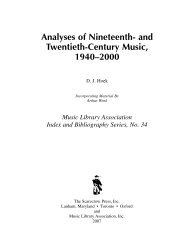Historical Dictionary of Lesbian Literature - Scarecrow Press
Historical Dictionary of Lesbian Literature - Scarecrow Press
Historical Dictionary of Lesbian Literature - Scarecrow Press
Create successful ePaper yourself
Turn your PDF publications into a flip-book with our unique Google optimized e-Paper software.
INTRODUCTION • xlv<br />
<strong>of</strong> masculinity and femininity are mythic and the associations they have<br />
with bodily morphology are merely arbitrary.<br />
Materialist feminisms have their basis in the work <strong>of</strong> Fredrich Engels,<br />
specifically his The Origins <strong>of</strong> the Family, Private Property and<br />
the State (1884). Here Engels argues that women were the first oppressed<br />
class. In order for men to consolidate private property and pass<br />
it on through privately controlled families, they must first control the<br />
sexuality <strong>of</strong> “their” women, in order to ensure the patrimony <strong>of</strong> their<br />
children. Therefore, through the social contract <strong>of</strong> marriage and through<br />
an array <strong>of</strong> formal and informal social rules, a woman’s sexuality was<br />
made the private property <strong>of</strong> the men in her family—first her father,<br />
who then effectively bartered her to her husband. Heterosexuality then<br />
is a system <strong>of</strong> power, rather than a biologically preferred state. French<br />
feminists have recognized the exploitative nature <strong>of</strong> the marriage contract<br />
since the 18th century. In 1791 Olympe deGouges proposed an entirely<br />
new and radically fairer marriage contract. Her work, focusing on<br />
the relation <strong>of</strong> female subjects to the Enlightenment idea <strong>of</strong> the social<br />
contract, engendered a French feminist tradition that continued into the<br />
late 20th century lesbian-feminist writings <strong>of</strong> Monique Wittig.<br />
A strong socialist feminism, kept alive throughout the 19th and 20th<br />
centuries, saw the oppression <strong>of</strong> women as part <strong>of</strong> the maintenance <strong>of</strong><br />
power by European, male global elites. In 1949 Simone de Beauvoir articulated<br />
a decidedly materialist, but more specifically single-issue,<br />
feminism in The Second Sex. This work had a tremendous influence on<br />
lesbians and other feminists after World War II. Here, de Beauvoir famously<br />
claimed that one is not born, but rather is made into a woman.<br />
She therefore popularized the idea that femininity, as separate from biological<br />
sex, was a socially constructed set <strong>of</strong> imperatives and prohibitions<br />
to which women were held in order to keep them in a subordinate<br />
social, political and economic position. It was only a small step from<br />
here to the realization that heterosexuality, depending as it does on essentialist<br />
notions <strong>of</strong> masculinity and femininity, is also a social construct<br />
that supports gender hierarchy. Interestingly, though she was the<br />
acknowledged site <strong>of</strong> origin for many <strong>of</strong> the most important and radical<br />
ideas <strong>of</strong> postwar lesbian feminism, her own chapter on lesbianism depends<br />
heavily on sexology and paints a troubled portrait. An understanding<br />
<strong>of</strong> the relationship between the economic and the sexual oppression<br />
<strong>of</strong> women characterizes both lesbian and other feminist



